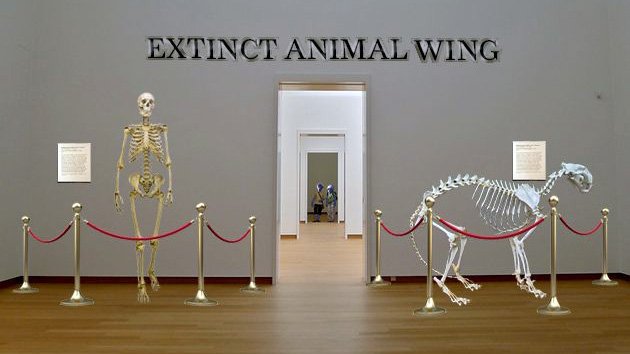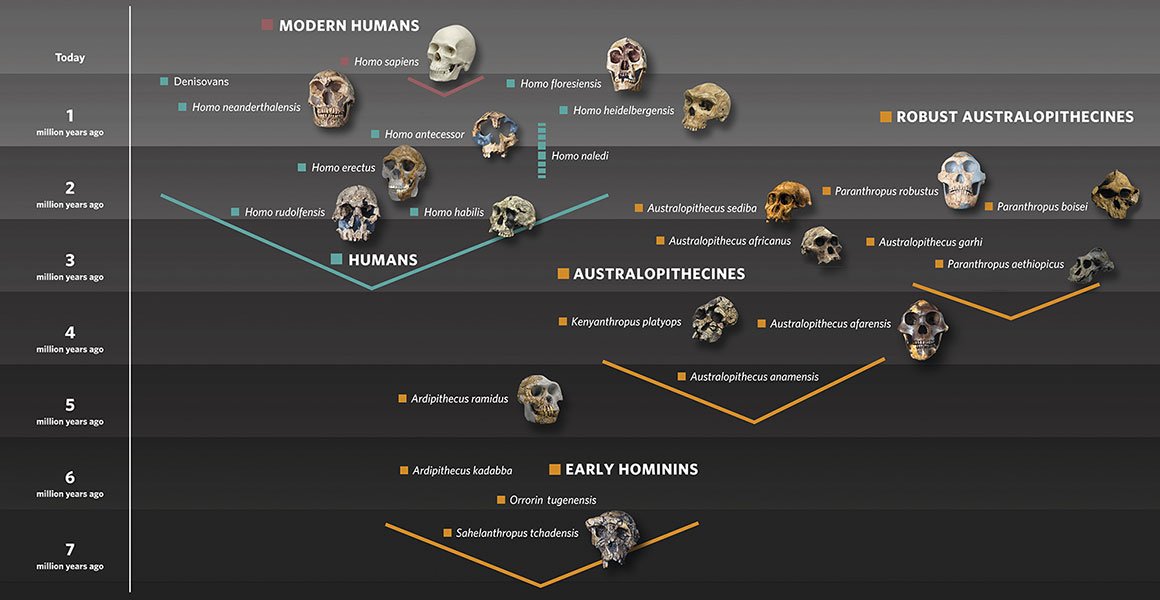Despite the wide array of colors, shapes, sizes and physical distributions that dwell among our species, the genetic diversity of the human population it is less varied than the genetic diversity of our near cousins': chimpanzees and gorillas (of about 150.000 individuals of each species, more or less). This means, even having so few chimpanzees, they have genetically less in common among themselves than us among our entire species, simply speaking, there's more genetic variety at a pack of assorted cookies than at the entire human DNA. This limited genetic pool suggests that, at a certain point, Homo sapiens' world population was composed by less than 150.000 individuals, perhaps not only once, but several times. Mighty and wonderful creation of nature as we believe we are, we were almost extinct; under today's standards, we'd be at the Red list of threatened species.
More than one may theorize about the need of still lists us in there, thanks to our non-efficient way of managing and distributing natural resources. Shame on me, I do believe that (got 4 computers on right now, while I'm only using one). But I'm talking about the fact that at a point our entire species could fit into a large sports stadium, consolidated humans, direct ancestors: those that settled the genetic base of our civilization; not Lucy, super-grandmother of our evolution history, hairy with strong limbs.

Humans 100% human. Like Adam and Eve, but real.
There's no consensus about what happened, but just like giant lizards were deleted off the map by a giant meteorite spiced with a bit of drastic climate change and volcano chips, a lot of evidence indicates that the eruption of a volcano almost did the same to us (almost!). The Toba, was a supervolcano located at what we know today as Indonesia. Huge volcano it was, wicked huge. It was so huge, that "it was" because it blew up in a mega-eruption that made 2.700 km3 of rock disappear off it's top, around 70.000 years ago, and he left no witnesses. This is not Pompeii or Chile, but the largest volcanic eruption we've ever studied.
The explosion was so big that it surpassed several times the second one we know about, around 200 years ago at the same island, yet another volcano. The Tambodora killed tens of thousands of people with a river of psychedelic lava and a tsunami that went at the speed of the first sexual encounter of a teenager. The sound of the explosion was heard at New York. Later, when the ashes covered the sky and the solar light and heat reflected at the atmosphere, the affected areas cooled down. Knowing this, we can imagine the same multiplied thousands of times, and add into the equation the Ice Age. The result is a planet where it was colder that in your ex's hearth, which makes it easy to understand why we almost became part of the "yet another extinct species" museum.

Sounds exaggerate, but it's how it was. A study suggests that the whole human population was very reduced: around 40 adults. I believe they went a little over the limit with their pessimism, but the optimistic ones speak of a couple of thousands. Regardless of the exact count, the "spreading" was an issue, few survivors among few tribes... and finding someone to reproduce with that was not your sister or cousin was a whole challenge. Ok, the cousin was not such a challenge.
This was not the last strong challenge the human species had to pass to reach "today". Everything that today is alive, including the human species, is the beautiful product of the confluence of physic, chemical and biologic laws at the right moment and place. A lot of specific circumstances were necessary so that you may spend (and waste!) your spare time at your computer reading this senseless text.
The circumstances of a solar system, with the "right" star size, long life span. The distance of the planet to the sun so that water may be found at a liquid state. The crash of a colossal asteroid that'd create the moon, balancing earth's axis and gave us a 24 hour day instead of 8 (I♥U, Thea with no brakes). The bacterial endosymbiosis that resulted into the birth of mitochondrion and chloroplast, allowing the bloom of life in superior forms. Flora colonization of dry land. Another asteroid (yes, there's just never enough of them), this one took out the dinosaurs for us, allowing mammals to take over the world. A series of climate changes 2.6 million years ago that modified the vegetal life at the Old Africa and force protohumans to walk off the woods they lived a,t to live at the steppes (and eat whatever they came across of). The already mentioned Toba. Surviving (or cross breeding) the Neanderthals. Get away from Africa. Cross the Oceans. Domesticate electricity. Invent Internet... So, until now, that we have Internet, antibiotics, supermarkets and Fast Food shops. All this things makes us invincible, unstoppable; almost perpetual, trascendental.

We are way too many now to endanger us as a species, it is way harder today than when we were running naked at the Great Rift Valley. Humans are a sort of crazy critters, highly adaptable that already overwhelmed a lot of evolution challenges. Today, the survival challenge is us: ecosystems are degrading and are less resilient to our activities. Regardless of the care we take, anyways, things sometimes just happen, meteorites strike, plagues kill and under the Yellowstone Park there's a Toba size volcano building up pressure right now.
We are small and fragile beings living at a small dot in the middle of the void of the universe. The same ones that 70.000 years ago almost stopped existing. The same ones that no other species would ever miss if we disappeared.
We are just starting to understand the need f taking care of our environment, meanwhile we send small pieces of "us" into space; just in case we wake up one day, to find out it's a bit "too freezing cold" to be summer.
